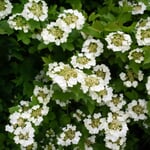Native shrub Common viburnum 'Compactum'

General Information
Flower: Abundant flowering in May and June with large, plate-shaped, white umbrella panicles that exude a pleasant fragrance. They have a high nectar content and feed numerous insects.
Fruit: The spherical, shiny red fruits ripen from September. Today they are considered inedible to poisonous, but in earlier times the very bitter fruits were made into tart jams. They are a valuable source of food for birds, especially in winter, as they cling to the branches for a very long time. Over 20 bird species eat them, as well as 11 different small mammals such as mice and hedgehogs.
Plant: With its dense, upright growth, this compact shrub only grows to around 1-1.5 m tall and wide, making it ideal for small home gardens or allotments (as a specimen or hedge plant) and for planting in larger containers. Its leaves serve as food for the caterpillars of four species of butterfly and, like the bark and unripe fruit, are classified as poisonous to humans.
Site and climate requirements: The plant grows in sun and partial shade in normal, well-drained soil, which must be sufficiently moist and nutrient-rich. Otherwise undemanding and uncomplicated; only during dry periods should sufficient water supply be ensured, especially when planting in containers.
Rating particularly (ecologically) valuable. Native plants
The value of a plant, apart from a monetary consideration, is determined by various functions. Plants produce oxygen, regulate the climate, protect the soil, provide us with food, fibers and other raw materials - and they form the basis of ecosystems that are all the more stable the more diverse they are. Plants provide habitats for countless organisms and promote biodiversity in a broad sense. In terms of this criterion, our native plants are far superior to so-called neophytes, i.e. plant species originating from other areas, as they safeguard the relationships and dependencies between flora and fauna that have developed in this country over thousands of years.
Well-established teams. From plants and animals
The closest relationships are between plants and insects. This goes so far that some insects live on just one plant species. If this is not present, for example because its habitat has been destroyed or it has been displaced by invasive neophytes, the insects that depend on it also die out - an observation that is as fascinating as it is tragic. This dependence can often be recognized by the name of the animals. The common viper's bugloss mason bee, for example, lives solely on the native common viper's bugloss, which also provides food for almost 40 other species of wild bees and butterflies.
But it is not only the flowers with their nectar and pollen supply that ensure the survival of insects, the stems and leaves of the plants are almost even more important, as they are used to build nests and are eaten by butterfly caterpillars, leaf wasp larvae and beetles. Over 90% of all herbivorous insects specialize in their food plants! This shows how important it is to have the most species-rich and ecologically valuable planting possible. Birds and small mammals such as dormice, dormice and squirrels feed on the seeds, berries, nuts and other fruits of plants. Their presence ensures the survival of the animals, especially in the cold season.
From a simple garden to an ecological hotspot
In the open countryside, many habitats are almost non-existent; for example, the dry, nutrient-poor sites with their very own flora or occasionally flooded, wet meadows. The use of pesticides or the progressive sealing and impoverishment of the landscape makes it difficult for plants and animals to find sufficient habitat and food. However, our gardens have great potential to at least counteract this and, by choosing the right (native) plants, can provide valuable biotopes and last refuges for animal species that have already become extremely rare, such as numerous butterflies that could be observed almost everywhere around 40 years ago.
Native woody plants: Flowers, leaves and fruit for countless animals
In addition to our existing range of native plants in the areas of perennials, roses, flowers and flower bulbs, we now also offer selected native woody plants. Some of these are already endangered species themselves, such as the shrub crown vetch, or contribute to the survival of many of our garden animals, such as the buckthorn, which is the main food plant for the caterpillar of the now rare lemon butterfly.
Product Information
Article Number 215534
The common snowball is a true all-rounder and was therefore quite rightly named Shrub of the Year 2025. It blooms and smells exuberantly in spring, then bears decorative red fruit from September until well into winter and, on top of that, displays a bright orange-red foliage in the fall. Its flowers and fruits provide food for numerous insects and birds. And it fits into any garden, as we have deliberately decided not to offer the wild species, which grows quite tall and wide, but a compact selection. This means that this beautiful shrub is also suitable for small green spaces in the city, for front gardens or even for large planters. Last but not least, its ability to regulate the water balance of the soil should be emphasized. It is one of the so-called pumping woody plants, which absorb and evaporate a lot of water and can thus, for example, drain damp depressions in the ground. In view of increasing extreme weather events with heavy rainfall, this is a characteristic that can hardly be overestimated.
Biennial shrub, with 3-4 shoots, cultivated in a 2-liter pot. Height on delivery 40-60 cm.
We ship from the beginning of February to the end of November and from mid-October to the end of November. Please note that the respective planting season may be delayed or shorter due to weather conditions.
If you have a question concerning this product you are welcome to contact us. For this your E-Mail program will open.
Customer service
For advice, spare parts or special requests - our customer service will take care of your questions and concerns, personally and competently.
You can reach us from Monday to Friday at +49 2309 939095 or anytime at info@manufactum.com
Gift Certificates
It is good for everything: With our PDF gift certificates you can choose from the entire Manufactum selection. Pick a motif which you can send by email or print out and present personally, immediately after submitting your order.
Order now


